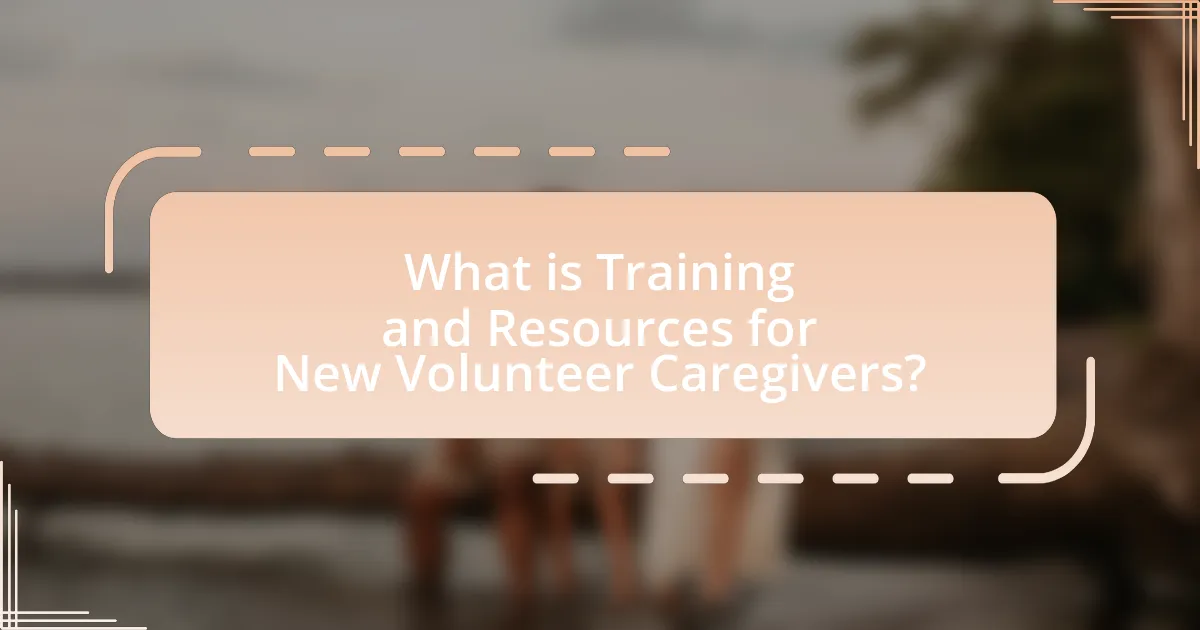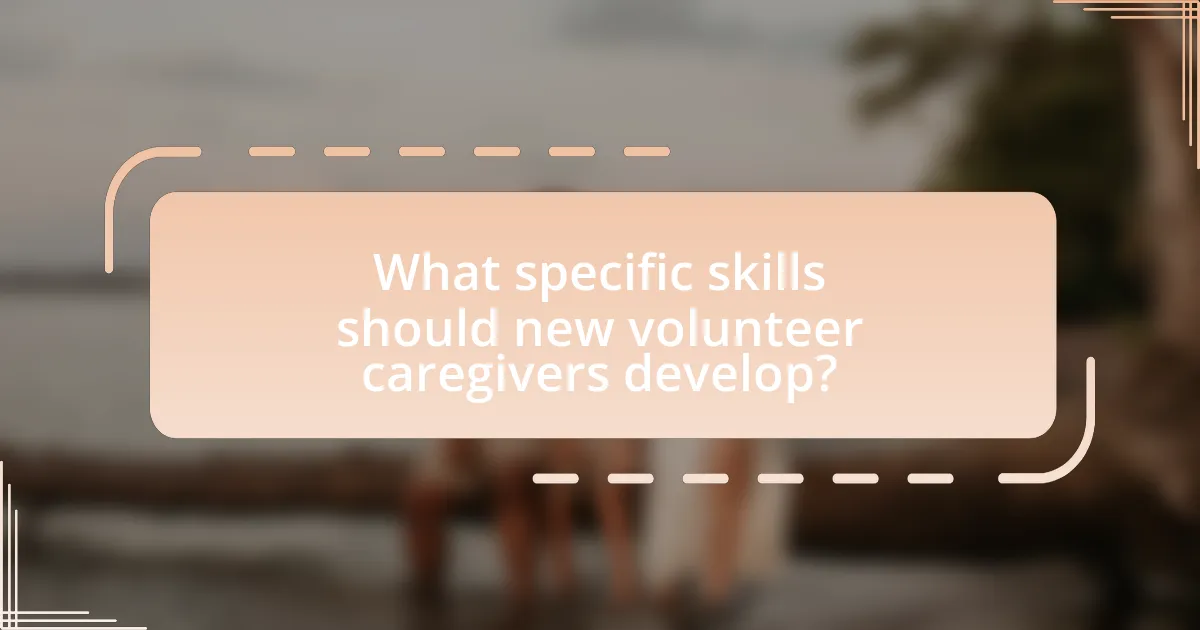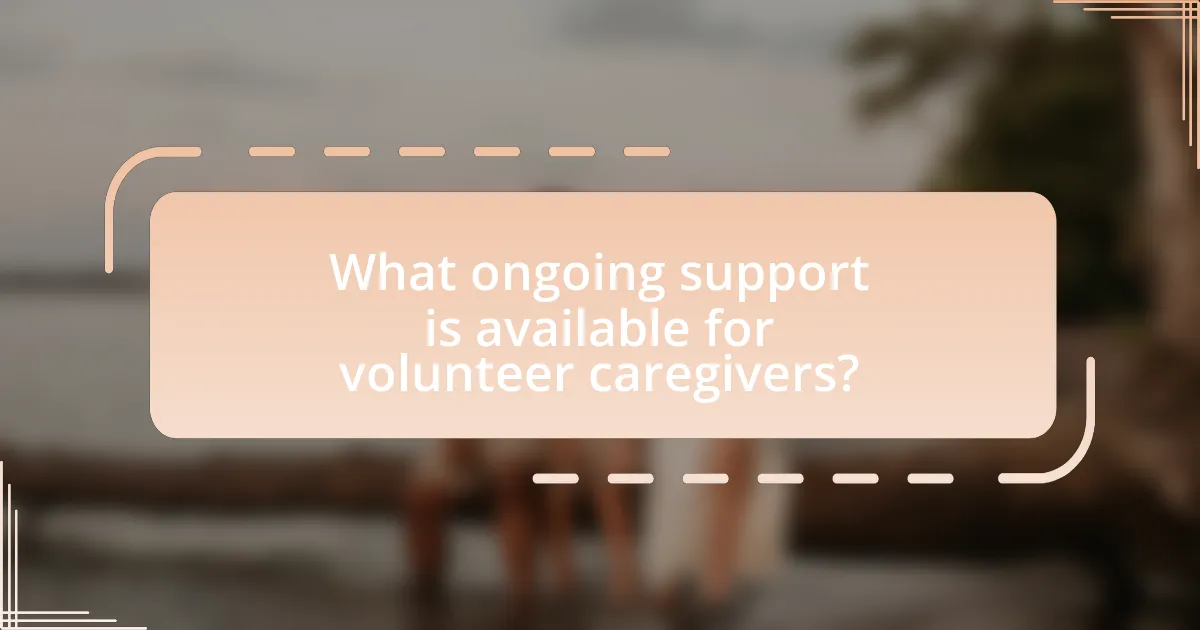Training and resources for new volunteer caregivers are essential components designed to equip individuals with the necessary skills and knowledge for effective caregiving. The article outlines the structure and components of training programs, emphasizing the importance of clear objectives, engaging content, skilled trainers, and practical application. It discusses various resources available to caregivers, including online platforms, printed materials, and mentorship opportunities, while highlighting the significance of training in enhancing caregiver confidence and improving patient outcomes. Additionally, the article addresses common challenges faced by new caregivers and offers best practices for managing responsibilities and maintaining well-being.

What is Training and Resources for New Volunteer Caregivers?
Training and resources for new volunteer caregivers encompass structured programs and materials designed to equip individuals with the necessary skills and knowledge to provide effective care. These training programs typically include workshops, online courses, and hands-on experiences that cover essential caregiving topics such as communication, safety protocols, and emotional support techniques. Research indicates that well-structured training significantly enhances caregiver confidence and competence, leading to improved care outcomes for those they assist. For instance, a study published in the Journal of Gerontological Nursing found that caregivers who underwent formal training reported higher satisfaction levels and better performance in their caregiving roles.
How do training programs for volunteer caregivers work?
Training programs for volunteer caregivers typically involve structured educational sessions that equip participants with essential skills and knowledge for providing care. These programs often include a combination of workshops, hands-on training, and informational resources covering topics such as communication techniques, basic medical care, and emotional support strategies.
For instance, organizations like the American Red Cross offer comprehensive training that includes CPR certification and first aid, which are critical for ensuring the safety of those in care. Additionally, many programs incorporate role-playing scenarios to help volunteers practice real-life situations they may encounter. Research indicates that well-structured training can significantly enhance the confidence and effectiveness of volunteer caregivers, leading to better outcomes for those they assist.
What are the key components of effective training programs?
The key components of effective training programs include clear objectives, engaging content, skilled trainers, practical application, and ongoing assessment. Clear objectives ensure that participants understand the goals of the training, which enhances focus and motivation. Engaging content, such as interactive activities and relevant materials, keeps learners interested and facilitates better retention of information. Skilled trainers possess the necessary expertise and communication skills to effectively convey knowledge and support participants. Practical application allows learners to practice skills in real-world scenarios, reinforcing their learning. Ongoing assessment, through feedback and evaluations, helps to measure progress and identify areas for improvement, ensuring that the training remains effective and relevant.
How do these components enhance caregiver skills?
The components of training and resources for new volunteer caregivers enhance caregiver skills by providing essential knowledge, practical techniques, and emotional support. These components equip caregivers with evidence-based practices, such as effective communication strategies and understanding of patient needs, which are crucial for delivering quality care. For instance, training programs often include role-playing scenarios that improve interpersonal skills, leading to better interactions with patients. Additionally, access to resources like manuals and online courses allows caregivers to continuously update their skills and stay informed about best practices in caregiving. Research indicates that well-structured training programs can significantly improve caregiver confidence and competence, ultimately resulting in better patient outcomes.
What types of resources are available for new volunteer caregivers?
New volunteer caregivers have access to various resources, including training programs, support groups, informational websites, and mentorship opportunities. Training programs often provide essential skills and knowledge about caregiving tasks, while support groups offer emotional and practical assistance from peers. Informational websites, such as those from national caregiving organizations, provide valuable articles, guides, and tools tailored for caregivers. Mentorship opportunities connect new caregivers with experienced individuals who can offer guidance and advice, enhancing their caregiving experience. These resources collectively empower new volunteer caregivers to perform their roles effectively and confidently.
Which online platforms provide valuable resources?
Online platforms that provide valuable resources for new volunteer caregivers include Coursera, Khan Academy, and the National Caregiver Training Program. Coursera offers courses on caregiving and health-related topics from accredited institutions, enhancing knowledge and skills. Khan Academy provides free educational content that can help caregivers understand various subjects relevant to their roles. The National Caregiver Training Program specifically focuses on training for caregivers, offering structured resources and support tailored to their needs. These platforms collectively contribute to the education and empowerment of volunteer caregivers.
What printed materials are essential for volunteer caregivers?
Essential printed materials for volunteer caregivers include caregiver handbooks, resource guides, emergency contact lists, and training manuals. Caregiver handbooks provide vital information on caregiving techniques, while resource guides offer local support services and community resources. Emergency contact lists ensure quick access to medical professionals and family members in urgent situations. Training manuals equip volunteers with necessary skills and knowledge, enhancing their effectiveness in providing care. These materials collectively support volunteer caregivers in delivering quality assistance and navigating challenges in their roles.
Why is training important for volunteer caregivers?
Training is important for volunteer caregivers because it equips them with essential skills and knowledge to provide effective care. Proper training ensures that caregivers understand the specific needs of those they are assisting, which can include medical, emotional, and social aspects. For instance, a study published in the Journal of Gerontological Nursing found that trained caregivers reported higher confidence levels and better outcomes in patient care. This highlights that training not only enhances the caregiver’s ability to perform tasks but also improves the overall quality of care provided to individuals in need.
How does training impact the quality of care provided?
Training significantly enhances the quality of care provided by volunteer caregivers. Well-structured training programs equip caregivers with essential skills, knowledge, and confidence to perform their duties effectively. Research indicates that trained caregivers demonstrate improved patient outcomes, such as higher satisfaction rates and better adherence to care protocols. For instance, a study published in the Journal of Nursing Scholarship found that caregivers who underwent comprehensive training showed a 30% increase in patient satisfaction compared to those who did not receive training. This evidence underscores the critical role of training in ensuring that caregivers deliver high-quality, compassionate, and effective care.
What are the potential risks of inadequate training?
Inadequate training poses significant risks, including decreased caregiver effectiveness, increased safety hazards, and higher turnover rates. Caregivers lacking proper training may struggle to perform essential tasks, leading to suboptimal care for clients. For instance, a study published in the Journal of Nursing Administration found that insufficient training correlates with a 30% increase in medication errors among caregivers. Additionally, inadequate training can result in safety risks for both caregivers and clients, as untrained individuals may not recognize or respond appropriately to emergencies. This lack of preparedness can lead to serious incidents, further emphasizing the necessity of comprehensive training programs for volunteer caregivers.
How can new volunteer caregivers access training and resources?
New volunteer caregivers can access training and resources through various organizations that offer structured programs and materials. Many nonprofit organizations, such as the Red Cross and local community health services, provide free or low-cost training sessions, workshops, and online resources specifically designed for caregivers. Additionally, platforms like Coursera and Udemy offer courses on caregiving skills, often created in collaboration with healthcare professionals. These resources ensure that new caregivers receive the necessary knowledge and support to perform their roles effectively.
What are the common challenges faced by new volunteer caregivers?
New volunteer caregivers commonly face challenges such as lack of training, emotional stress, and time management issues. The absence of adequate training can lead to feelings of inadequacy and uncertainty in providing care, as many volunteers may not have prior experience in caregiving roles. Emotional stress arises from the responsibility of caring for individuals with complex needs, which can be overwhelming without proper support systems in place. Additionally, managing time effectively between caregiving duties and personal commitments often proves difficult, leading to burnout. These challenges are documented in studies highlighting the need for structured training programs and support networks to assist new caregivers in their roles.

What specific skills should new volunteer caregivers develop?
New volunteer caregivers should develop skills in communication, empathy, basic medical knowledge, and time management. Effective communication enables caregivers to understand and respond to the needs of those they assist, fostering trust and rapport. Empathy is crucial for providing emotional support and understanding the experiences of individuals in care. Basic medical knowledge, including first aid and understanding common health conditions, ensures caregivers can respond appropriately in emergencies. Time management skills help caregivers prioritize tasks and manage their responsibilities efficiently, which is essential in a caregiving environment. These skills are supported by training programs and resources that emphasize the importance of these competencies in enhancing the quality of care provided.
How can communication skills be improved for better caregiving?
Communication skills can be improved for better caregiving through targeted training programs that focus on active listening, empathy, and clear expression. These programs often incorporate role-playing scenarios and feedback mechanisms, which have been shown to enhance caregivers’ ability to understand and respond to the needs of those they care for. Research indicates that caregivers who undergo communication skills training report higher satisfaction in their interactions and improved relationships with care recipients, as evidenced by a study published in the Journal of Gerontological Nursing, which found that effective communication directly correlates with better patient outcomes.
What techniques enhance effective communication with clients?
Active listening, clear language, and empathy are techniques that enhance effective communication with clients. Active listening involves fully concentrating on what the client is saying, which fosters trust and understanding. Clear language eliminates jargon and ensures that clients comprehend the information being conveyed. Empathy allows caregivers to connect with clients on an emotional level, making them feel valued and understood. Research indicates that effective communication can improve client satisfaction and outcomes, as evidenced by a study published in the Journal of Healthcare Management, which found that organizations with strong communication practices saw a 25% increase in client satisfaction ratings.
How does active listening contribute to caregiving?
Active listening significantly enhances caregiving by fostering effective communication and building trust between caregivers and those they support. This practice allows caregivers to fully understand the needs, concerns, and emotions of the individuals in their care, leading to more personalized and responsive support. Research indicates that caregivers who engage in active listening can better identify specific issues and provide appropriate interventions, ultimately improving the quality of care. For instance, a study published in the Journal of Gerontological Nursing found that active listening skills among caregivers correlated with higher satisfaction levels in care recipients, demonstrating the tangible benefits of this approach in caregiving contexts.
What practical skills are essential for volunteer caregivers?
Practical skills essential for volunteer caregivers include effective communication, basic medical knowledge, emotional support, and time management. Effective communication allows caregivers to understand and convey information clearly to those they assist, which is crucial for building trust and ensuring proper care. Basic medical knowledge, such as understanding medication administration and recognizing signs of distress, is vital for providing safe and effective support. Emotional support skills enable caregivers to offer compassion and empathy, which are important for the mental well-being of those in their care. Time management skills help caregivers prioritize tasks and ensure that all needs are met efficiently. These skills collectively enhance the quality of care provided by volunteer caregivers.
How can caregivers learn basic medical assistance techniques?
Caregivers can learn basic medical assistance techniques through structured training programs, online courses, and hands-on workshops. These educational resources often cover essential skills such as first aid, CPR, and medication management. For instance, organizations like the American Red Cross offer certified courses that provide practical knowledge and skills necessary for effective caregiving. Additionally, community colleges and local health departments frequently provide workshops tailored for caregivers, ensuring they receive up-to-date training in medical assistance techniques.
What safety protocols should caregivers be familiar with?
Caregivers should be familiar with safety protocols that include infection control, emergency response procedures, and proper lifting techniques. Infection control protocols involve hand hygiene, use of personal protective equipment (PPE), and understanding how to prevent the spread of illnesses, which is critical in maintaining the health of both caregivers and those they assist. Emergency response procedures encompass knowing how to react to medical emergencies, including CPR and first aid, which can save lives in critical situations. Proper lifting techniques are essential to prevent injuries to both caregivers and care recipients, as improper lifting can lead to musculoskeletal injuries. These protocols are supported by guidelines from organizations such as the Centers for Disease Control and Prevention (CDC) and the Occupational Safety and Health Administration (OSHA), which emphasize the importance of safety in caregiving environments.

What ongoing support is available for volunteer caregivers?
Ongoing support for volunteer caregivers includes access to training programs, peer support groups, and resources from organizations dedicated to caregiver assistance. Training programs often provide skill development and updates on best practices, while peer support groups offer emotional support and shared experiences among caregivers. Organizations such as the Family Caregiver Alliance and the National Alliance for Caregiving provide resources, including educational materials and helplines, to assist caregivers in their roles. These supports are essential for enhancing caregiver well-being and effectiveness in providing care.
How can volunteer caregivers find mentorship opportunities?
Volunteer caregivers can find mentorship opportunities by connecting with local nonprofit organizations, healthcare facilities, or community service groups that focus on caregiving. These organizations often have established mentorship programs or can facilitate connections with experienced caregivers willing to provide guidance. For instance, the National Caregiver Alliance offers resources and networking opportunities that can help caregivers find mentors. Additionally, online platforms such as Care.com and LinkedIn can be utilized to search for mentorship connections within caregiving communities.
What role do experienced caregivers play in mentoring new volunteers?
Experienced caregivers play a crucial role in mentoring new volunteers by providing guidance, sharing knowledge, and fostering confidence in caregiving practices. Their experience allows them to offer practical insights into patient care, effective communication, and emotional support, which are essential for new volunteers to develop their skills. Studies show that mentorship from seasoned caregivers significantly enhances the learning curve for new volunteers, leading to improved service quality and volunteer retention rates. For instance, a report by the National Volunteer Caregiving Network highlights that structured mentorship programs led by experienced caregivers resulted in a 30% increase in volunteer satisfaction and effectiveness.
How can peer support groups benefit new caregivers?
Peer support groups can significantly benefit new caregivers by providing emotional support, practical advice, and a sense of community. These groups create an environment where caregivers can share experiences, reducing feelings of isolation and stress. Research indicates that participation in peer support groups can lead to improved mental health outcomes, with studies showing that caregivers who engage in such groups report lower levels of anxiety and depression. Additionally, caregivers can gain valuable insights and coping strategies from others facing similar challenges, enhancing their caregiving skills and resilience.
What are best practices for new volunteer caregivers?
Best practices for new volunteer caregivers include effective communication, understanding the needs of those they care for, and maintaining boundaries. Effective communication ensures that caregivers can express concerns and provide clear information to those they assist, fostering trust and cooperation. Understanding the needs of individuals, including their physical, emotional, and social requirements, allows caregivers to offer personalized support, which is essential for quality care. Maintaining boundaries is crucial to prevent caregiver burnout and to ensure a professional relationship, which helps in sustaining long-term volunteer engagement. These practices are supported by research indicating that effective caregiver training programs improve caregiver confidence and satisfaction, ultimately enhancing the quality of care provided.
How can caregivers effectively manage their time and responsibilities?
Caregivers can effectively manage their time and responsibilities by prioritizing tasks, utilizing scheduling tools, and setting clear boundaries. Prioritizing tasks involves identifying urgent and important responsibilities, which helps caregivers focus on what needs immediate attention. Scheduling tools, such as digital calendars or task management apps, can assist in organizing daily activities and appointments, ensuring that caregivers allocate time efficiently. Setting clear boundaries is essential to prevent burnout; caregivers should communicate their availability and limits to those they assist and seek support when needed. Research indicates that caregivers who implement structured time management strategies report lower stress levels and improved overall well-being.
What strategies can help caregivers maintain their well-being?
Caregivers can maintain their well-being by implementing self-care practices, establishing support networks, and setting boundaries. Self-care practices, such as regular exercise, adequate sleep, and mindfulness techniques, have been shown to reduce stress and improve mental health among caregivers. Establishing support networks, including family, friends, and support groups, provides emotional assistance and practical help, which can alleviate feelings of isolation. Setting boundaries helps caregivers manage their time and energy effectively, preventing burnout. Research indicates that caregivers who engage in these strategies report higher levels of satisfaction and lower levels of stress, underscoring the importance of proactive well-being measures.